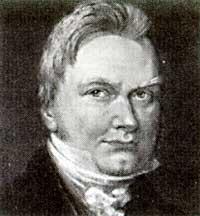Berzelius, Jons Jacob
(1779-1848)
Swedish chemist born in Vaversunda (Sorgard) in 1779. Being very young his father died. Anna remarried and her stepfather took over the young man's education. He studied medicine at the University of Uppsala, but soon showed a greater tendency to physics and chemistry. In the following years he taught medicine and pharmacy at the University of Stockholm, but never abandoned chemistry.

In 1807 he determined the basic structure of chemical compounds using the law of stable composition found by Proust. He began to investigate atomic weight from the theories of Dulong, Petit and Mitscherlich. The result of this work is the Bercelius table, where it determined the weight of atoms. However, Berzelius did not take into account the details of the atoms and molecules that Avogadro had given on his list and there were many errors. In this sense, the table of atomic weights did not reach echo until Cannizzaro declared its value in 1860.
The most well-known contribution of Berzelius is the chemical nomenclature. In performing his experiments, he thought that the need to mention the full name of the chemical elements delayed the work. To solve this problem he proposed using the first letter of the element, both to refer to it and to explain the components of the compounds. This proposal was approved immediately and today it can be said that it was fundamental for the development of chemistry.
He then took charge of the electricity. It was based on Volta's experiments to study the changes that electrical current produces in chemical compounds. With the help of Hisinger he discovered the existence of an atom or group of immutable atoms in chemical reactions, renaming their discovery radical.
Berzelius continued to analyze the chemical elements. In 1818 he discovered selenium, silicon in 1824 and thorium in 1829.
Between 1821 and 1849 he published a prestigious journal on chemistry. In it, he presented the works and experiments of the chemists with his clear opinion. He condemned research works that did not conform to his theories and got the reputation of the dictator. On the contrary, Berzelius' suggestions were very important in other areas, and for example, it is due to the fact that the concepts of catalysis, isomers or proteins are now fully accepted.
In 1835 he married and the Swedish king Charles XIV gave him the title of baron. Death led her to Stockholm in August 1848.
Buletina
Bidali zure helbide elektronikoa eta jaso asteroko buletina zure sarrera-ontzian











